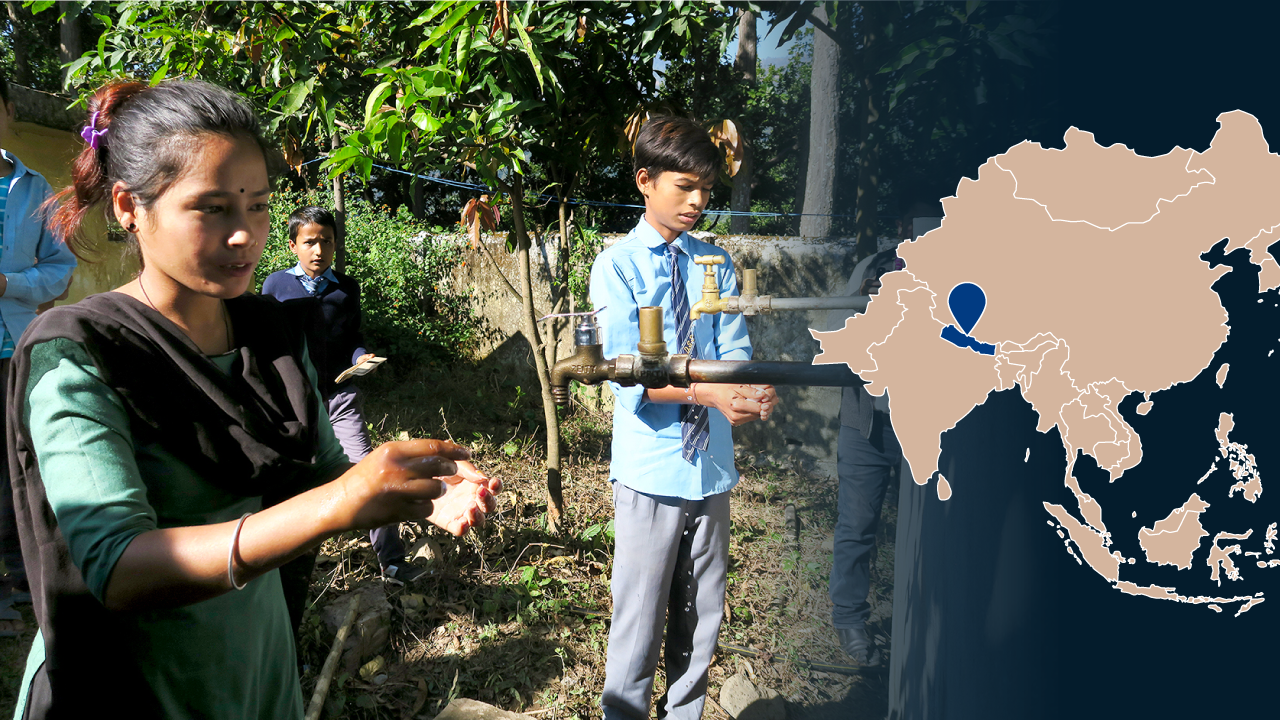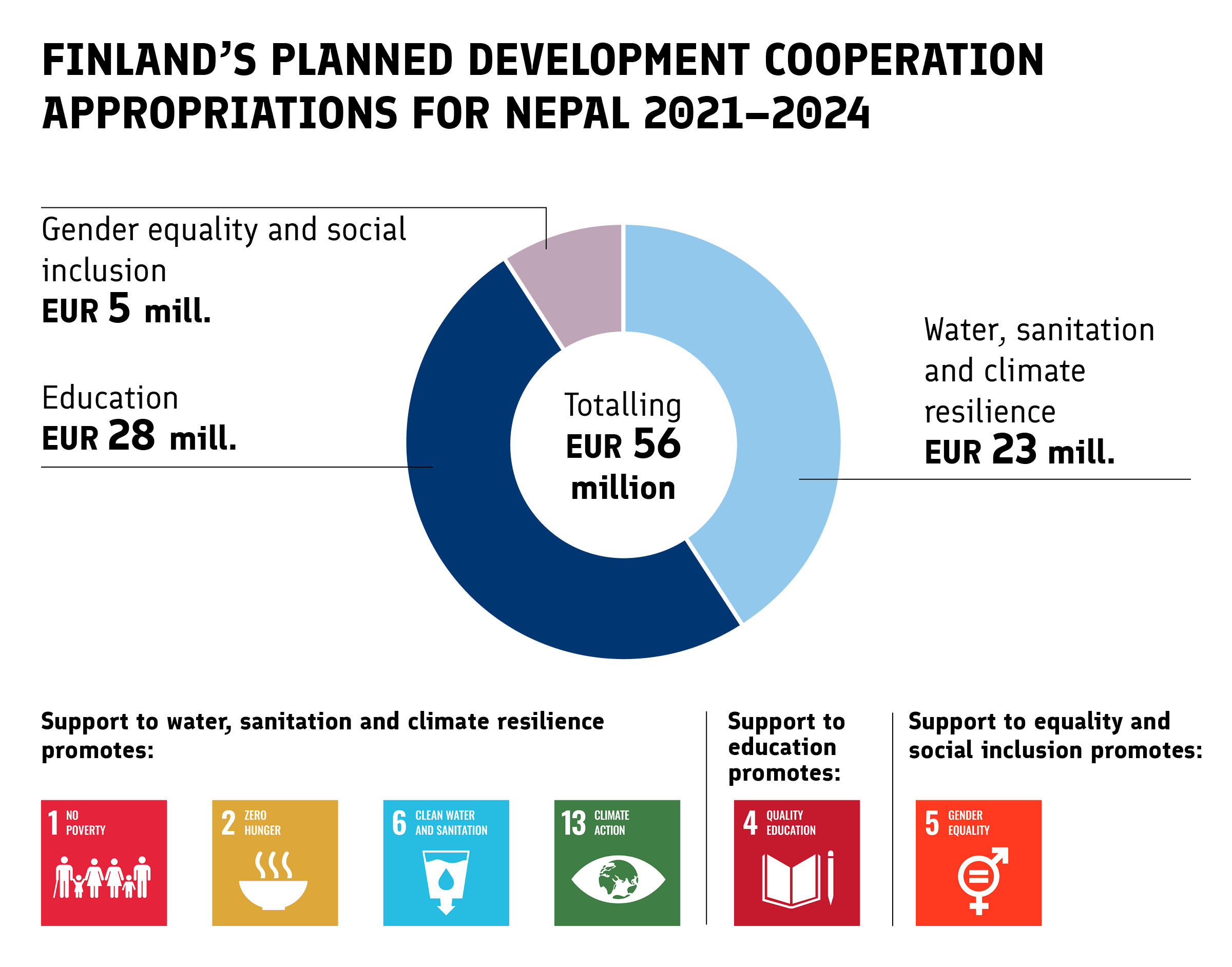Finland's relations and development cooperation in Nepal
Finland’s development cooperation in Nepal improves the quality of education, access to clean drinking water and sanitation services, climate resilience and livelihood development, as well as gender equality and social inclusion.

Water projects supported by Finland have brought clean water to about 2 million people in Nepal. The water resources management project in Far-Western Nepal has already given more than 380,500 people access to drinking water. Schools have been equipped with toilets and water supply points, which helps to promote health and encourages more girls to attend school. Photo: Hanna Päivärinta / MFA
Nepal has made great strides towards democracy. The civil war, which had lasted for ten years, ended in 2006. The new constitution adopted in 2015 strengthened local governance and women’s participation in decision-making. However, the democracy remains fragile and governments change frequently.
Even though there has been a substantial reduction in poverty in the recent decades, about one fifth of the population still lives in extreme poverty. Many people in Nepal are discriminated against on grounds of their gender, caste, ethnic background or the areas where they live. Nepal is a mountainous country, making it particularly vulnerable to natural disasters and climate threats.
Finland and Nepal have maintained close relations for many decades, with emphasis on development cooperation. Since the 1980s, Finland has supported Nepal in such areas as forestry, water, sanitation and hygiene (WASH), and education. Together with the donor community, Finland supports Nepal to reach the Sustainable Development Goals of the UN, and to become a middle-income country in the next few years.
The objectives of Finland’s comprehensive activities in Nepal are described in the Country Strategy and the Country Programme. The latter focuses on development cooperation. The key objectives of the Country Strategy for Nepal for the period 2021–2024 are reducing social inequalities, supporting sustainable development, and climate and disaster resilience. Another objective is to diversify political and economic cooperation between Finland and Nepal.
Finland’s country strategy for Nepal 2021–2024 (PDF, 380 KB)(Link to another website.)
Outcomes of Finland’s development cooperation with Nepal in the period 2021–2024
In the period 2021–2024, Finland’s bilateral development cooperation with Nepal focuses on supporting an inclusive education system, and improving climate resilience and health through sustainable water supply, sanitation and hygiene. Development cooperation also strengthens regional livelihood development, gender equality and social inclusion. The planned support for Nepal is EUR 56 million in 2021–2024.
Finland’s development cooperation country programme in Nepal (PDF, 546 KB)(Link to another website.)

During the previous programme period (2016–2019), Finland focused its support on access to clean water and sanitation services, development of education, and on improving the participation opportunities of women and vulnerable groups.
Finland's development cooperation in the education sector
Finnish development cooperation supports economic equality, improving a school system that promotes democracy, and inclusive education.
Expected outcomes: An inclusive education system that provides students with the necessary skills contributing to Nepal’s economic and democratic development
- The quality and results of basic and secondary education will improve
- Education will become more accessible, equitable and inclusive, and better consideration will be given to different needs of the students
Ongoing programmes and projects
- Support to Nepal’s new School Education Sector Plan (SESP) in 2021–2030 is in its starting phase. Government of Nepal is planning to finance around 90% of the plan. Finland will be one of eight donors with a contribution of EUR 19 million between 2022 and 2026.
- Support to the education component of UNICEF's Country Programme Action Plan (CPAP) 2023–2027 is EUR 4.2 million targeting to improve the quality, equity, inclusiveness and resilience of education.
Finland's development cooperation in WASH, climate resilience, and livelihood development
Finland will support the health of Nepalese communities and their ability to tackle climate threats by improving access to clean water and sanitation services, and livelihood development.
Expected outcomes: The climate resilience and health of the communities will improve
- The members of village communities will have access to more sustainable water, sanitation and hygiene services
- People will benefit from more sustainable livelihoods and value chains
Ongoing programmes and projects
- Sustainable WASH for all (SUSWA). A bilateral WASH project in the remote Karnali province of Nepal, to be carried out between 2021 and 2027. Finnish contribution to the project is EUR 9 million. The European Union contributes EUR 10.1 million. See more: SUSWA(Link to another website.)
- Green Resilient Agricultural Productive Ecosystems (GRAPE). The aim of the project, to be carried out in the Karnali and Far Western provinces between 2021 and 2024, is to achieve climate resilient green growth through value chains. The project is jointly funded by Finland, Germany and the European Union. Finland is contributing EUR 4 million to the project. See more: GRAPE(Link to another website.)
- Finnish-Nepali project for improved capability of the Government of Nepal to respond to the increased risks of natural disasters related to weather and climate between 2018 and 2023. The project is implemented by the Finnish Meteorological Institute and it has a budget of EUR 621 900.
- Towards Arsenic Safe Drinking Water in Nepal between 2020 and 2024. The project is implemented by the Finnish Environment Institute and the Geological Survey of Finland and it has a budget of one million euros. See more: Finnish Environment Institute(Link to another website.)
Finland’s development cooperation in promoting gender equality and social inclusion
Finnish development cooperation supports the equal opportunities and well-being of women and girls, with a focus on women with disabilities and in vulnerable situation. Gender equality and social inclusion are also cross-cutting objectives in all development cooperation.
Expected outcomes: Enhanced social equality and prosperity of women and girls, including those with disability and in vulnerable situation
- Women will gain more economic independence and become more active politically
- Violence and cultural discrimination against women will decrease in both public spaces and in private life
Ongoing programmes and projects
- Finland is contributing EUR 4.54 million to support the country strategy of UN Women 2023-2027. The programme is focused on strengthening gender responsive laws, green macroeconomic policy; sustainable and decent livelihood; transforming gender inequalities and strengthening coordination across three tiers of government.
Highlights of the Results Report 2022
The 2022 local, provincial and national level elections consolidated democracy in Nepal. Despite an economic slowdown, Nepal still aims to graduate from the Least Developed Country category by 2026.
At the end of 2022, the Rural Village Water Resources Management Project came to an end after 16 years. In 2022, the project contributed for the last time to the very significant result of 147,113 people receiving improved access to drinking water supply and 18,264 people benefiting from irrigation facilities. Finland continues to support the WASH sector with a new project focusing on dignified menstruation management in the Karnali province. During the year, water, sanitation and hygiene facilities were improved in 233 educational institutions, notably in partnership with UNICEF. Finland also contributed to the drafting of the School Education Sector Plan, thereby advancing the adoption of water, sanitation and hygiene standards in Nepalese schools, among other things.
National results in education were good and the number of out-of-school children continued to decline despite the long school closures due to the COVID-19 pandemic in 2020–2021. Children returned to school and the completion rate in primary education continued to increase. The school meals programme was extended, and over 3 million children received a mid-day meal in school in 2022. Significant results were also achieved in improving equity and equal access of all children to primary and secondary education.
The Government of Nepal’s adoption of its second National Action Plan on UNSCR 1325 and 1820 has given hope for a safer and more dignified life, especially for women survivors of conflict. UN Women, supported by Finland, assisted the Government in drafting the Action Plan.
Finland’s partners in Nepal
Finland operates in Nepal as a member of the European Union and the donor community. As an EU Member State, Finland participates in the dialogue with the Nepalese government encouraging the country to promote human rights and good governance.
Finland also supports economic and social development in Nepal by providing funding for UN organisations and international development financing institutions. Finland also provides humanitarian aid on a needs basis and most of this assistance is channelled through UN humanitarian organisations and Finnish non-governmental organisations.
A large number of Finnish non-governmental organisations support social development in Nepal in cooperation with the country’s own civil society actors. The focus of the support is on such areas as education, health, rights of persons with disabilities, and better food security.
Team Finland cooperation
The aim of Team Finland in Nepal is to promote the image of Finland and to highlight Finland’s strengths as well as promoting business and trade opportunities between Nepal and Finland. Nepal is a long-term development partner of Finland and Finland supports Nepal through different funding channels.
The economic cooperation between Finland and Nepal is still rather modest. However, the aim is to develop trade relations especially in sectors that have a comparative advantage for Finland and that have ties to Finland's long-term development cooperation in Nepal and the experiences, networks and expertise it brings.
Finland has advantage especially in the sectors of water, sanitation and hygiene, livelihood development and climate resilience as well as education. There is potential also in sectors such as cleantech (including renewable energy and smart energy solutions), ICT, digitalization, hydropower, meteorology and urban planning. There is an investment protection agreement between the two countries.
Developing commercial and economic cooperation alongside traditional development cooperation is one of Finland’s key objectives in Nepal in the period 2021–2024. Development cooperation supports the achievement of this objective by improving such areas as the business environment.


